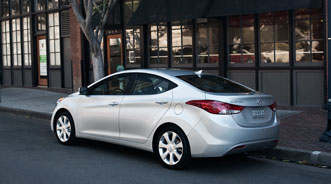Industry Cheers Passage of United States–South Korea Free Trade Agreement

Industry groups, dealers and analysts, as well as Ford’s Alan Mulally, all applauded this week’s congressional action to push the United States–South Korea Free Trade agreement that has awaited ratification since it was approved by both countries in 2007.
In a study requested by the Senate, the United States International Trade Commission found KORUS will create up to 280,000 American jobs. The study said the agreement is also expected to add $10 to $12 billion to our gross domestic product, $10 billion in annual merchandise exports to Korea and eliminate tariffs on 95 percent of bilateral industrial and consumer goods.
Associations and Ford believe dealers, along with both American and South Korean manufacturers, are looking forward to the agreement’s positive impact on the industry.
Under KORUS, officials explained South Korea will immediately cut its tariff on U.S. vehicles in half and fully eliminate that tariff in five years. Meanwhile, the U.S. will eliminate its 2.5 percent tariff on Korean units in five years and its 25 percent tariff on Korean trucks within 10 years.
Government and industry leaders believe the result will be more vehicles sold, more jobs created and better prices for consumers.
Mulally, Ford’s president and chief executive officer, declared, “Approval of the U.S.–Korea Free Trade Agreement will open new opportunities for Ford to reach even more Korean customers by selling them more American-made Focuses, Tauruses, Mustangs, Escapes and Explorers, among other cars and trucks.
“This would not be possible without the improvements made last year to increase transparency and address trade policies,” Mulally continued. “We deeply appreciate the tireless efforts of the Obama administration and Congress to both improve the agreement and make this opportunity a reality.”
Beyond vehicles from the Blue Oval, the congressional action drew cheers from the American Automotive Policy Council, which represents member companies Chrysler Group, General Motors and Ford.
AAPC highlighted the pact not only with South Korea but also free trade agreements with Colombia and Panama as well as reauthorizing the Trade Adjustment Assistance program.
“In particular, we thank the administration and Congress for their hard work to improve the auto provisions of the Korea free trade agreement and for approving all three agreements,” AAPC president Matt Blunt stated.
“These free trade agreements will further open important markets for Chrysler, Ford and GM exports, and protect American jobs,” Blunt continued. “Our companies make the best cars and trucks on the road and we are excited for the opportunities these agreements represent.”
Beyond the corporate level, a dealer association also welcomed the news regarding KORUS.
“In addition to the new agreements with Colombia and Panama, KORUS will promote our national security and speed our economic recovery,”
American International Automobile Dealers Association president Cody Lusk insisted.
“For too long America has sat on the sidelines of global trade, watching other countries establish agreements and leave our businesses and workers out in the cold. America’s international nameplate dealers and their more than 400,000 employees are encouraged by the action, and believe it indicates a renewed commitment from Washington, D.C., to getting our economy back on track,” Lusk went on to say.
Edmunds Provides More Industry Background on Agreement Benefits
President Obama and South Korean President Lee Myung-bak are slated to visit a GM assembly plant in Michigan today to tout the U.S.–South Korea Free Trade Agreement.
Edmunds.com pointed out the agreement comes as South Korean manufacturers Hyundai and Kia are enjoying unprecedented sales success in America.
The company referenced four major points.
—Hyundai has sold 492,915 vehicles in the U.S. so far in 2011 (through September), up 20.2 percent over the same period a year ago. Kia has sold 367,405 vehicles so far this year, up 37.1 percent over the same period last year.
In addition, Kia’s market share in 2011 is up to 3.9 percent from 3.1 percent last year, while Hyundai’s market share is up to 5.2 percent from 4.8 percent in 2010.
—Edmunds.com stressed both makes are selling more vehicles without having to offer big discounts. Hyundai’s average discount percentage per vehicle sold in September was 4.8 percent, down significantly from the 10.5 percent in discounts offered in September of last year. Kia’s discount percentage was 8.6 percent last month, compared to 10.3 percent last September.
—As a result, Edmunds.com calculated Hyundai’s and Kia’s transaction prices have gone up 4.9 percent and 4.2 percent, respectively, compared to last year. Industry-wide, year-over-year transaction prices are up just 1.6 percent.
—When looking only at cars — excluding trucks and SUVs — Edmunds.com indicated the Korean manufacturers’ success is even more distinguished.
The average transaction prices for cars are up 7.4 percent and 9.8 percent, respectively, for Hyundai and Kia year to date compared to last year. Analysts determined car-only ATPs for domestic brands Chevy and Ford, by comparison, are down 0.1 percent and 0.6 percent, respectively, over the same period.
“It’s long been believed the South Korean market was not a level playing field for U.S. automakers, but the version of the Free Trade Agreement bill approved by Congress addresses most of the key structural trade restrictions that limited access,” Edmunds.com senior analyst Bill Visnic surmised.
“Previous tariffs, taxes and other restrictions that made it difficult for mainstream American vehicles to be affordable and competitive in the South Korean market will be cut back and eventually eliminated, giving American-made imported vehicles a better chance to compete,” Visnic continued.
Impact Beyond the Auto Industry
A report published by Bloomberg delved into the broad impact this agreement is expected to have.
Bloomberg explained the bills now go to President Obama, who spent two years seeking to broaden Democratic support for pacts revised from initial agreements reached by his predecessor. Analysts insist the South Korea deal is the biggest for the U.S. since the North American Free Trade Agreement in 1994 because it removes duties on almost two-thirds of American farm exports, and phases out tariffs on more than 95 percent of industrial and consumer exports within five years.
Bloomberg’s contention is congressional moves may diminish concern that the U.S. will turn to protectionism amid an unemployment rate that exceeds 9 percent, coming soon after a Senate vote designed to punish China for an undervalued yuan.
Analysts added approval may also give impetus to Obama’s trans-Pacific trade initiative, which Japan, the world’s third-largest economy, is considering joining.
“This is a welcome development showing policy makers can be farsighted and come to an agreement that is positive for all parties involved in the long run in terms of GDP growth,” said Robert Subbaraman, Hong Kong-based chief economist for Asia excluding Japan at Nomura Holdings. “There’s been a lot of market disappointment in policymaking this year.”
The complete Bloomberg analysis is available here.

 View The Latest Edition
View The Latest Edition

